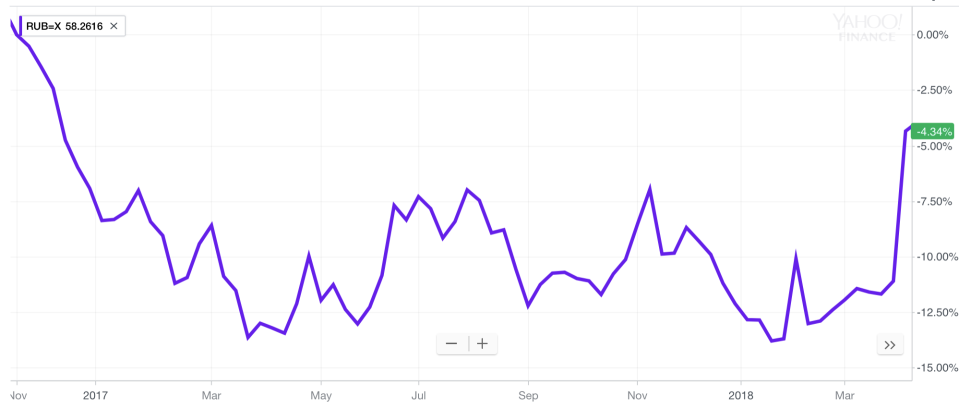Trump appears to be mad at China, Russia, or the Fed
President Donald Trump is upset about something.
In a tweet Monday morning, Trump fired off a somewhat perplexing thought about China, Russia, currency devaluation, and U.S. monetary policy. All in just 116 characters.
“Russia and China are playing the Currency Devaluation game as the U.S. keeps raising interest rates,” Trump said. “Not acceptable!”
Russia and China are playing the Currency Devaluation game as the U.S. keeps raising interest rates. Not acceptable!
— Donald J. Trump (@realDonaldTrump) April 16, 2018

The central complaint in Trump’s tweet seems to be that the U.S. dollar — which has been falling from a 13-year high since the election — is falling as a result of the “Currency Devaluation game” that the President believes China and Russia are playing.
The Chinese yuan, however, has gained about 8% against the U.S. dollar since the election. Were the Chinese devaluing their currency, the yuan would be weaker against the dollar.

The ruble, meanwhile, weakened sharply against the dollar earlier this month when the U.S. announced a new round of economic sanctions against Russia. This also sent Russian stocks lower as well as ruble-denominated debt.
Since the election, however, the dollar is still down about 4% relative to the ruble.

That either Russia, China, or both, are engaged in a wholesale program to devalue their currency to make U.S. exports less competitive — and thus increase the size of the U.S. trade deficit — seems unlikely given these moves.
Over the long term, the value of a country’s currency does reflect the strength of its economy. Shorter-term market and economic dynamics, however, can cause the kinds of depreciation we’ve seen in the dollar recently. Earlier this year, Trump said that he does prefer a strong dollar.
On this background, then, the dollar’s weakness is perhaps being interpreted by Trump as a sign that the U.S. economy is doing poorly and that markets are not rewarding him for what he in January called the “unprecedented economic success and wealth creation that has taken place over the last 12 months.”
Additionally, Trump has made an economy boogeyman out of China with tit-for-tat trade announcements earlier this month roiling financial markets.
A Federal Reserve complaint?
There is, however, a second possibility for interpreting Trump’s tweet. And that is to see it as a complaint about the Federal Reserve’s recent decision and likely future decisions to raise interest rates.
In March, the Fed raised its benchmark interest rate target by 0.25% to a range of 1.5%-1.75%. This set the effective fed funds rate, or the benchmark interest rate at which banks lend money to one another on a short-term basis, at 1.63%, the highest since September 2008.
Additionally, the Fed’s latest projections about the economy and policy released with its March announcement indicated that at least two more interest rate hikes are likely this year.
All else equal, higher interest rates should increase the value of the dollar relative to other currencies.
But a combination of the recovery in other developed economies outpacing U.S. economic growth, expectations for tighter monetary policy in Europe, the dollar unwinding a historic run-up seen from late-2014 through mid-2016, and the U.S. government increasing debt issuance after the tax cuts passed by the Trump administration last year, the dollar has been falling.
Early last year, Trump also said that he does prefer a low interest rate policy. Which makes sense, because as a real estate developer the entire business is essentially using borrowed money to acquire land, build buildings, and then pay off the debt with the proceeds. Lower interest rates make this easier.
This second path also opens up what some in markets would see as a more concerning possibility, which is that Trump wants to meddle in the Federal Reserve’s decisions on monetary policy.
The Federal Reserve is famously politically independent, meaning that it, in theory, it operates outside of the pressures faced by elected officials. The market places faith in the Fed’s ability to conduct monetary policy as a response to economic developments because of its political independence. A loss of independence could see markets doubt the Fed’s policy outlook, which helps anchor both current and expected interest rates.
—
Myles Udland is a writer at Yahoo Finance. Follow him on Twitter @MylesUdland
Read more from Myles here:


